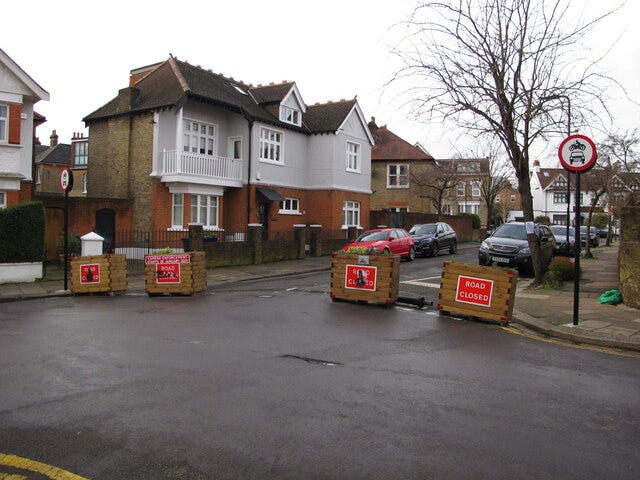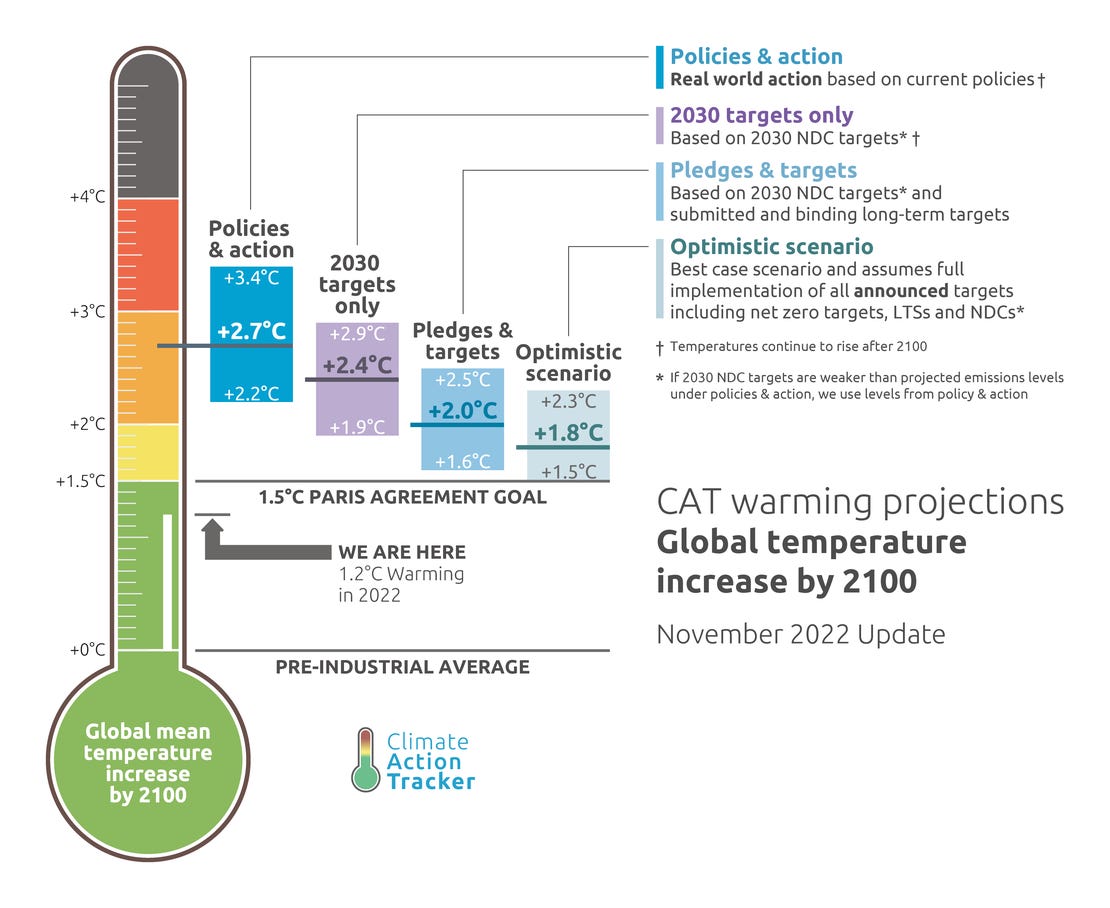😡 Mad at Rishi - MM#580
Good day my good friend.
I must thank those of you who have so far provided feedback on the new-look newsletter (you can do by clicking the button at the end of this email). One of the most common bits of feedback is to make the content less UK-centric. I am working on that, but I must admit that today, it will be very UK-centric, for which I won’t apologise this time. But I promise you, I will do better. Thank you all again for your feedback - keep it coming!
Mobility Camp is taking place on 26th September 2023 in Birmingham. It would be great to see you there. Get your tickets now.
If you like this newsletter, please share it with someone else who you think will love it. I will love you forever if you do. ☺️
James
👨💼 Political problems need a political solution
The fall-out from the Uxbridge by-election continues. Now, the UK Prime Minister Rishi Sunak has ordered a review into Low Traffic Neighbourhoods. He is also being pushed to reverse the 2030 ban on the sale of new petrol and diesel-only cars, among many other reversals of green policies. Not to mention the fact that many schemes that will reduce carbon emissions are suffering from delays and are off-track (including HS2).
We know that such schemes are supported and have little impact on voting intention. Yet the politics around sustainable transport continues to be lost nationally. Research has been done, the likes of Sustrans and Living Streets have advocated, we know how to deliver the change to a sustainable and just future, and yet we continue to fail. This is because we as professionals and practitioners refuse to acknowledge something simple. Policy is not made in research and facts. It is made in politics. If, as we so often complain, we know that politics is the barrier to sustainable transport, it is in politics that the answer lies.

Voting is only part of the answer to this. The other part is appealing to political values of those who do make decisions. Someone values freedom and choice? Tell them how frequency = freedom and how new bikes lanes give choice through making things safer. If they have a community focus, say how new public spaces give space for community activities. If you want a cheat sheet for UK parties and their core beliefs, this is a good summary.
But most of all? Us professionals need to start getting political. Not as in the “all members of the other party are b*******s” but as in seek to actively influence the political conversations. Others are doing so, and because of that we are losing and losing badly, and have done for 30 years. No more. This must not happen any more. And if we don’t do something, then no-one well.
What you can do: There are far more things that you can do right now than you think. Here is a non-exhuastive list that can be applied by anyone, including professionals:
For your local highways portfolio holder, Google on what policies they stood on. If you have a sustainable transport scheme, sell it to them on those grounds. If you have an idea, do the same.
Join a political party. Make connections within the party, however local it is. Work on developing their transport policies and approach in a pragmatic way, working with others (note that this may involve a lot of compromise).
Build a local pressure group based on action. Deliver a community project based on roadspace reallocation, a new bus service, and get people enthused and supportive of each other. Then pressure politicians to repeat your trick - they love good news stories.
When sending a letter asking them to support a scheme or be more pro-sustainable transport, do it as a group. Politicians will ignore one letter from one person. The same letter from many is harder to ignore.
All of this will give you a good start. And we need to make that start.
🚦 Big Projects, Big Problems
The UK’s Infrastructure and Projects Authority issued its annual report recently, and it gives a good overall commentary of the state of major projects across the UK. And there has been plenty of copy written about how big projects are currently off-track. For instance, HS2 has a big old Red flag against it, with the report saying that a Red means:
Successful delivery of the project appears to be unachievable. There are major issues with project definition, schedule, budget, quality and/or benefits delivery, which at this stage do not appear to be manageable or resolvable. The project may need re-scoping and/or its overall viability reassessed.
Ouch. But there is more to it than that, surely?
When you look at the report, the number of projects with a big old Red associated with them has gone down since last year. This includes East-West Rail that seems to have got its act together. But the number of projects rated as Amber has increased hugely, mainly as many more projects are now being assessed by the IPA.

The reports on progress are interesting, if lacking detail for me. The National Infrastructure Pipeline is always a good read to see what is going on with the major projects. But it is good to see a portfolio-based approach being taken to the delivery of projects, and the IPA setting standards on good governance on major projects. This report is the first evidence of the benefits of such an approach, that take a long time to bed in, a long time to master, but in the end lead to something deliverable. Even if your favourite project is in trouble.
What you can do: For professionals delivering a major project / portfolio of projects or about to start doing so, the IPA’s Project Delivery Functional Standard is a must read and must action. As is the Project Set Up Toolkit.
For advocates, see if your favourite project is in there, and demand answers from your MP or local authority delivering it.
🎓 From academia
The clever clogs at our universities have published the following excellent research. Where you are unable to access the research, email the author - they may give you a copy of the research paper for free.
TL:DR - The mix of online and offline retail poses a lot of challenges for supply chains and delivery drivers.
“Door-to-door” carbon emission calculation for airlines – Its decarbonization potential and impact
TL:DR - Getting to and from the airport adds up to 22% to the overall carbon emissions of the trip compared to the flight alone.
Comparing Urban Air Mobility Network Airspaces: Experiments and Insights
TL:DR - Structuring urban air space effectively is really hard.
Will the latest British reforms to rail passenger service procurement work?
TL:DR - No. But if they were to be successful, this paper shows how.
✊ Awesome people doing awesome things
Annette Jezierska and her amazing team at The Future Fox are doing some truly amazing work in genuine online community engagement (and not just a place to seek comments like many other platforms). Their work with Bolsover Council on creating something genuinely innovative on their Placebuilder platform that makes masterplanning a site meaningful as opposed to an optional extra as it so often is.
Hopefully, this will now become the gold standard in engaging with people meaningfully. Especially as our political leaders seem to absolve themselves of leadership duties at the drop of a hat.
Got someone doing something awesome in transport decarbonisation, transport justice, or transport safety who deserves a shout out? Let me know about them.
📼 On the (You)Tube
In times like this, you need to remind yourself what you are fighting for, and how you can make the world a better place. This video by Not Just Bikes reminds us what great places cities can be so long as we give them a sense of place.
What you can do: Watch the video to remind yourself why the fight is worth it. Send it to someone else who may be feeling down about things right now. Show them the fight is worth it.
📗 To read on the train
Recently, I finished The Miracle Pill by Peter Walker. What I loved about this book wasn’t that its core message was “walking and cycling = great” but the details of the little ways that inactivity is designed into our lives. Such as the stairs being hidden behind the lifts.
What you can do: Order it from your local independent book store. Read it. Enjoy it. Then share it with others.
🖼️ Graphic Design

If you want some further inspiration, this is it - the Climate Action Tracker Thermometer. Current actions committed to now will achieve 2.7C of warming. Current pledges will achieve 2C of warming. Every 0.1C matters. And success is possible. We just need to do it, and keep the faith even though others test it.
What you can do: Just look at it. The goal of the Paris Climate Agreement to achieve well below 2.0C in warming is possible. Its within our grasp. We just need to fight for it.
📚 Random things
These links are meant to make you think about the things that affect our world in transport, and not just think about transport itself. I hope that you enjoy them.
How to responsibly get rid of the stuff you’ve decluttered (The Verge)
Want to know where batteries are going? Look at their ingredients. (MIT Technology Review)
There's a way to get healthier without even going to a gym. It's called NEAT (NPR)
River pollution 'offsets' for homes in England and Wales may not work (New Scientist)
Amtrak’s Endless Ridership-vs-Coverage Problem (Human Transit)
✍️ Your Feedback Is Essential
I want to make the calls to actions better. To do this, I need your feedback. Just fill in the 3 question survey form by clicking on the below button to provide me with quick feedback, that I can put into action. Thank you so much.


